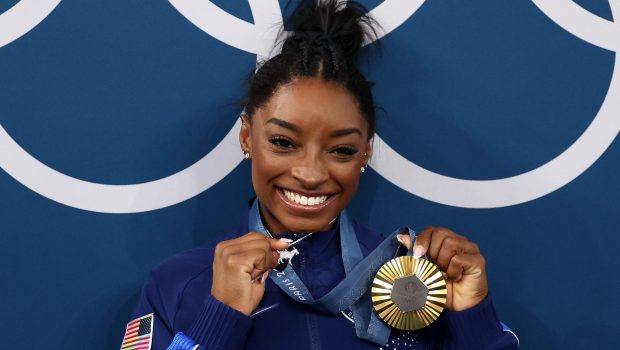Simone Biles Seemingly Takes a Jab at Donald Trump: ‘I Love My Black Job’
- vivian

Biles won her second gold after the women’s all-around gymnastics performance on Thursday at the 2024 Olympics.
Simone Biles has celebrated her latest Olympic triumph with an apparent swipe at Donald Trump, related to his recent comments about “Black jobs.”
The most decorated US gymnast won her second gold medal at Paris 2024—and the sixth of her career—in the individual all-around event on Thursday, August 1. She then cemented her self-embraced status as the GOAT (greatest of all time) with a goat pendant necklace that she said was inspired by the “haters.”
But on Friday morning, there was one other person the 27-year-old decided to respond to while reflecting on her latest achievement in her profession with a post on X that read: “I love my Black job.”
I love my black job 🖤 https://t.co/c5wPc6xOY3
— Simone Biles (@Simone_Biles) August 2, 2024
Biles’ post appeared to be a reference to comments made by the former president on Wednesday when he spoke at the National Association of Black Journalists convention.
The 78-year-old told a roomful of Black journalists that immigrants are taking “Black jobs.” He said: “I will tell you that coming from the border, are millions and millions of people that happen to be taking Black jobs.”
When asked to expand on the unsubstantiated and vague remark, Trump responded: “A Black job is anybody that has a job. That’s what it is.”
Donald Trump to the National Association of Black Journalists: “A lot of the journalists in this room are black. I will tell you that coming from the border are millions and millions of people that happen to be taking black jobs.
Q. “What’s exactly is a black job, sir?"
Trump:… pic.twitter.com/cEnaXrNpE9
— Republicans against Trump (@RpsAgainstTrump) July 31, 2024
During the same event in Chicago, Trump cast doubt on whether Vice President Kamala Harris is actually Black. “I’ve known her for a long time indirectly, directly, very much,” Trump exclaimed.
“And she was always of Indian heritage and she was promoting Indian heritage. I didn’t know she was Black until a number of years ago when she happened to turn Black, and now she wants to be known as Black. So I don’t know, is she Indian, or is she Black?”
He might be confusing Harris with Nikki Haley…
Other than Trump, Ohio Sen. JD Vance also had older comments resurfaced in which he said he found it strange “that we’ve tried to turn a very tragic moment, Simone Biles quitting the Olympic team, into this act of heroism.”
“And I think it reflects pretty poorly on our sort of therapeutic society, that we try to praise people not for moments of strength, not for moments of heroism, but for their weakest moments,” Vance continued.
Biles stepped out of competition at the Tokyo Olympics three years ago, noting that she was struggling with her mental health and emotional state while experiencing the “twisties”—a disconnect between mind and body while gymnasts are airborne—which can cause serious injuries, especially when doing some of the most difficult maneuvers very quickly.
Her decision in 2021 to remove herself from the competition sparked a national conversation over mental health. It earned her both recognition from those who praised her for putting her well-being first and criticism from others who called her a quitter.